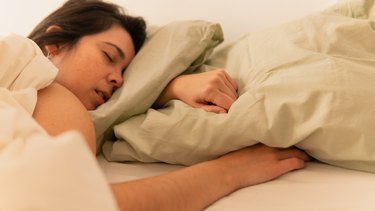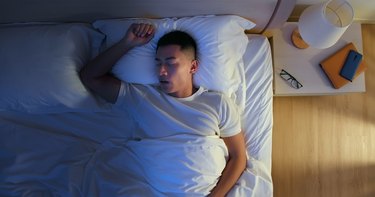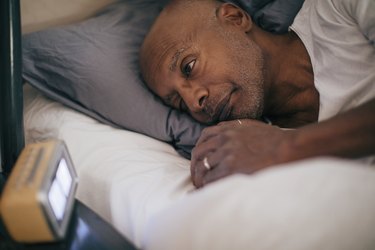
Has anyone ever told you that you talk in your sleep? You're in good company.
Up to 65 percent of adults (and 50 percent of young children) will sleep talk — also known an somniloquy — at some point in their lives, according to the American Academy of Sleep Medicine (AASM).
Video of the Day
Video of the Day
Most sleep talkers don't remember a thing about their midnight murmurs — which, more accurately, can range from babbling to coherent sentences and even shouting, per the AASM.
While somniloquy is considered a type of parasomnia (i.e., an abnormal behavior that happens during sleep), it's typically harmless. But the exact reason why it happens is still not well understood.
"If your [sleep] talking is occasional and happens without any other sleep issues, it's most likely not a concern," says Kelly Glazer Baron, PhD, MPH, a clinical psychologist and director of the behavioral sleep medicine program at the University of Utah.
But in some cases, sleep talking can be a sign of a more serious condition.
Here, we review some of the reasons you might be talking in your sleep and when it's a good idea to see a sleep specialist.
1. You’re Stressed
Anyone who's ever tossed and turned in bed with worry can attest that stress sabotages your sleep. Indeed, stress can cause increased sleep fragmentation (i.e., more frequent awakenings), Dr. Glazer Baron says.
When your sleep is disrupted, you're more likely to sleep talk, she says.
And the cycle only continues: Lack of sleep leads to an increase in stress hormones like cortisol, which then further disturbs sleep patterns, per Baylor College of Medicine.
Fix It
If stress is causing your sleep talking, try these stress-management techniques to help you decompress before you fall asleep, per Baylor College of Medicine:
- Journal before bed to help clear your mind.
- Try an app for guided meditation or breathing exercises.
- Do something relaxing to help your body wind down after a long day (think: a warm bath or some light yoga before bed).
- Limit screen time and excessive light exposure in the bedroom before bed.
- Limit caffeine in the afternoon and avoid it in the evening.
2. You Have Post-Traumatic Stress Disorder
In some cases, talking in your sleep may be a symptom of post-traumatic stress disorder, or PTSD.
PTSD is a mental health disorder that can develop if you've gone through a traumatic experience or event, according to the Substance Abuse and Mental Health Services Administration (SAMSA).
"One of the most common symptoms [of PTSD] is nightmares," Dr. Glazer Baron says. During these bad dreams, brief awakenings and sleep talking can happen, she says.
Other features of PTSD alongside nightmares and trouble sleeping include the following, per SAMSA:
- Flashbacks, or feeling like the event is happening again
- Feeling alone or detached from others
- Losing interest in activities
- Having angry outbursts or other extreme reactions
- Feeling worried, guilty or sad
- Frightening thoughts
- Having trouble concentrating
- Having physical pain like headaches or stomachaches
- Avoidance of memories, thoughts or feelings closely associated with traumatic events
- Memory issues
- Negative beliefs about yourself or others
- Irritability
- Hypervigilance
- Startling easily
- Substance use
Despite sleep talking often being connected to dreaming (and nightmares), it can also happen at any stage of sleep, according to the AASM.
Fix It
If you’re living with PTSD, you shouldn’t have to navigate it alone. Reach out to a therapist or psychiatrist, who can help you manage your symptoms, Dr. Glazer Baron says.
3. You Drank Alcohol Before Bed
Turns out, a night of drinking can affect more than just your sleep quality. It may also cause you to talk in your sleep.
While alcohol may help you fall asleep faster, it causes disrupted sleep later in the night, Dr. Glazer Baron says.
And the science backs her up: An August 2019 study in Sleep found that drinking alcohol within four hours of bedtime led to fragmented sleep.
These frequent awakenings can then set off sleep talking, Dr. Glazer Baron says.
Fix It
Try limiting the amount of alcohol you drink, especially in the hours leading up to bedtime.
4. You Have Sleep Apnea
Sometimes somniloquy can be a sign of a more serious sleep issue, like sleep apnea.
Sleep apnea is a condition where you stop breathing for brief periods while asleep, due to a blockage of your airway, Dr. Glazer Baron says. These episodes can sometimes even startle you awake.
As we've learned, any interruption to your "normal" sleep (including sleep apnea) can cause sleep talking. And the more severe your sleep apnea is, the more likely you'll get woken up throughout the night, leading to greater chances of sleep talking, per the Cleveland Clinic.
Other symptoms of sleep apnea include the following, per the Cleveland Clinic:
- Feeling tired or even exhausted when waking up
- Daytime sleepiness
- Snoring
- Mood changes
- Disruptions in brain function
- Waking up in the middle of the night
- Pauses in breathing while asleep that others witness
- Unusual breathing patterns
- Insomnia
- Night sweats and feeling restless at night
- Sexual dysfunction
- Waking up feeling short of breath or like you're choking
- Headaches, especially when waking up
Fix It
If you think you might have sleep apnea, talk to your doctor. They can refer you to a sleep specialist who can run tests and properly diagnose you.
The most comprehensive diagnostic test for sleep apnea is an overnight sleep study, which involves sleeping in a medical facility as a doctor monitors your heart rate, breathing, blood oxygen levels and brain waves, according to the Cleveland Clinic.
Once you’ve been properly diagnosed, your doctor can figure out the right treatment for you, which could include lifestyle changes, a CPAP machine, night guards or other procedures, per the Cleveland Clinic.
Many other disruptive sleep-related disorders (i.e., parasomnias) can cause sleep talking, Dr. Glazer Baron says.
Depending on the type of disorder, you may even look like you're awake as you talk (like with sleepwalking), move abnormally, express emotions or do unusual things, according to the Cleveland Clinic.
Some parasomnias that can involve sleep talking include the following, per the Cleveland Clinic:
- Sleep terrors: When you wake up suddenly in a state of fear or terror, which can last anywhere from 30 seconds to a few minutes.
- Confusional arousals: Episodes where you appear to be half awake, but you're confused and disoriented to time and space, which can last anywhere from a few minutes to several hours.
- Sleepwalking (somnambulism): A condition where you get out of bed and move around with your eyes open, often causing you to talk, too.
- REM sleep behavior disorder: A disorder where you act out, vocalize (e.g., talk, swear, laugh, shout) or make aggressive movements (e.g., punching, kicking, grabbing) in reaction to a violent dream.
- Nightmare disorder: When you have vivid dreams that can induce fear, anxiety or terror.
These parasomnias can also get worse with stress, sleep deprivation and environmental disturbances (like outside noise), Dr. Glazer Baron says.
Fix It
Like with sleep apnea, talk to your doctor if you, your bed partner or someone in your family notices any abnormal sleep behavior. They can refer you to a sleep specialist, Dr. Glazer Baron says, who can identify and treat any underlying issues that are causing the parasomnia.
In the meantime, you can try practicing good sleep hygiene habits to see if that helps your symptoms — like sticking to a consistent sleep schedule, having a good sleep environment (a cool, dark and quiet room) and limiting alcohol before bed.
How to Stop Sleep Talking
Because sleep talking is still not fully understood — and the root cause of each case may vary — there are no specific, science-backed strategies to stop it.
Still, prioritizing healthy sleep habits can be a huge help when it comes to improving your sleep quality.
Try these general tips for better sleep, according to the Cleveland Clinic:
- Stick to a regular sleep schedule (in other words, go to sleep around the same time and wake up around the same time each day).
- Aim for seven to nine hours of sleep per night.
- Give yourself 30 to 60 minutes of quiet, screen-free time to wind down before bed.
- Minimize and manage your stress levels.
- Limit your alcohol use.
- Avoid caffeine for at least six hours before bedtime.
- Exercise regularly.
- Make sure your bedroom is quiet and dark and keep the thermostat between 60 to 67 degrees Fahrenheit, which is the optimal temperature for sleeping.
When to See a Doctor About Sleep Talking
In general, sleep talking is not a concern unless it's accompanied by other symptoms.
If your sleep talking impairs your quality of life and causes things like daytime sleepiness or difficulty waking up in the morning, call your doctor for a proper diagnosis, Dr. Glazer Baron says.
Similarly, see a sleep specialist if your sleep talking episodes have come on suddenly as an adult, or if they include feelings of fear, screaming or violent actions, per the Cleveland Clinic.
- Cleveland Clinic: “Sleep Apnea”
- Cleveland Clinic: “Parasomnias & Disruptive Sleep Disorders”
- Sleep: “Evening intake of alcohol, caffeine, and nicotine: night-to-night associations with sleep duration and continuity among African Americans in the Jackson Heart Sleep Study”
- Baylor College of Medicine: “How stress can affect your sleep”
- Substance Abuse and Mental Health Services Administration: “Post-Traumatic Stress Disorder (PTSD)”
- Cleveland Clinic: “Talking In Your Sleep? Here’s What That Could Mean”
- University of Utah Healthcare: "Kelly Glazer Baron, PhD, MPH, DBSM"
Is this an emergency? If you are experiencing serious medical symptoms, please see the National Library of Medicine’s list of signs you need emergency medical attention or call 911.





